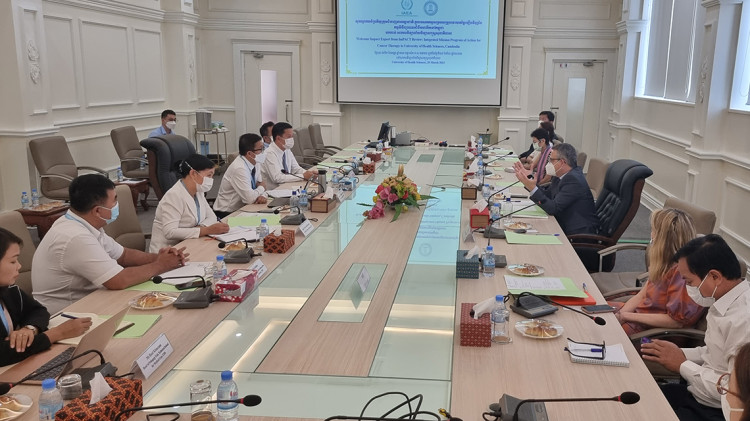Cambodia has made progress in formulating several important health policies and expanding access to key health services, a team of international experts concluded following an IAEA review mission carried out on the request of the country’s Ministry of Health. The imPACT mission, which took place from 27 to 31 March, was conducted by 10 experts with the goal of providing assessment and advice for the planning of the new centre at Luang Mè Hospital, dedicated to cancer treatment. The recommendations of the mission will contribute to Cambodia’s renewed cervical cancer strategy and offer guidance for strengthening human resources through training and education programmes, and for improving capacities for cancer diagnosis and treatment in the country’s main hospitals.
The findings of the mission, conducted a decade after Cambodia’s first imPACT Review in 2013, noted that Cambodia has made significant achievements over the past 10 years, expanding radiotherapy services from one unit in 2013 to four units in 2023. Cambodia has also taken steps to establish the National Non-Communicable Diseases (NCD) Strategy and the National Action Plan on Cervical Cancer and has introduced HPV immunization.
“The imPACT Review mission comes at a very timely moment,” said Mam Bunheng, Cambodia’s Minister of Health. “The report will be used as evidence to inform the planning for our new National Cancer Centre at Luang Mè Hospital and the development of our National Cancer Control Programme. In addition, recommendations from the report will be used to align with existing national strategies important for cancer control, such as the National NCD strategy and National PHC strategy.”
The review team identified a number of areas for further strengthening, including addressing high out-of-pocket payments that hamper access to health services, improving the referral system for patients among different levels of health care, and improving health seeking behaviour and awareness raising among communities.
According to GLOBOCAN, the online cancer statistics database of the Cancer Surveillance Branch of the International Agency for Research on Cancer (IARC) under the auspices of the World Health Organization, there are around 18 000 new cases of cancer in Cambodia every year, and by 2040, this figure is expected to rise to almost 32 000 per year. Liver (25.1 per cent), lung (14.5 per cent) and colorectal (9.2 per cent) are the most common new cancer cases in men; while women are affected by breast (19.1 per cent), cervical (11.5 per cent) and liver (10.8 per cent) cancer. Given the scale of the growing problem, Cambodia has submitted a request to be part of Rays of Hope, the IAEA’s flagship initiative to bring radiotherapy to underserviced areas of the world.
The review mission team included several experts from the Asia and the Pacific region (Australia, India, the Republic of Korea, Malaysia, New Zealand, Philippines and Thailand), underscoring the utility of South-South cooperation in addressing regional health priorities.
“The imPACT mission has already contributed to strengthening regional collaboration,” said Suleeporn Sangrajrang, Deputy Director, Health System Development National Cancer Institute Thailand. “Through support from the IARC, a physician from Luang Mè will attend a cancer registry course in Korea, and delegates from Cambodia will attend a colposcopy course for cervical cancer screening. In addition, two medical doctors from Luang Mè will receive breast surgery training from our institute.”
The mission team included a representative from the City Cancer Challenge Foundation (C/CAN), one of the IAEA’s international partners. Phnom Penh participates in the C/CAN city network, and C/CAN will use the imPACT report to inform their implementation support and to align with other partners in follow up support.
“The imPACT review has arrived at the perfect time for C/CAN as we begin operations in Phnom Penh,” said Isabel Mestres, Chief Executive Officer of C/CAN. “It provided us with a situational analysis and recommendations from international experts on cancer control priorities. Joining the mission is an example of international collaboration to support local stakeholders in implementing cancer care solutions and improving people’s lives in Phnom Penh and Cambodia.”
During the mission, the team of experts visited major cancer hospitals and met key national stakeholders, including representatives from the Ministry of Health, from medical education institutions such as the Medical University and the Nursing College, and from non-governmental organizations that are providing support to patients and raising awareness in communities. Meetings were also held with other key international partners, including UNICEF, related to their work on childhood cancer and immunization; the World Bank, which is funding a large HPV project; UNFPA, supporting cervical cancer screening; and the United Nations Development Programme, supporting analysis on health financing reforms.
The IAEA, through its technical cooperation programme, has been providing Cambodia with assistance in the field of radiation medicine since 2012, helping to build and enhance institutional and human capabilities in cancer management, particularly in diagnostic radiology, radiotherapy services and nuclear medicine.
“The mission enabled us to assess the work done so far and plan future activities aimed at further strengthening cancer care services in the country,” said Kamal Akbarov, Radiation Oncologist in the IAEA’s Division of Human Health.
“We expect that the Review findings will inform Cambodia’s Country Programme Framework, which is currently under development,” added Mio Kato, IAEA Programme Management Officer for Cambodia. “Cambodia has been identified as one of the target countries in the region for the Rays of Hope initiative, and national counterpart institutions are working on the design of projects for the 2024-2025 TC programme. We expect the findings to contribute to this planning process, so that future TC projects will be able to effectively support the overall national cancer management strategy.”






